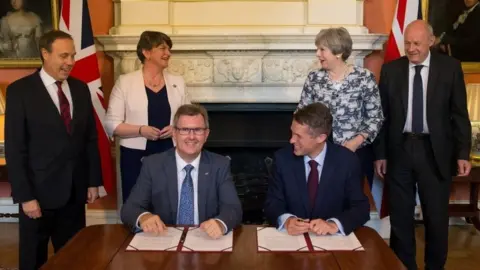Theresa May's DUP-Tory deal criticised as 'shabby and reckless'
 Reuters
ReutersTheresa May's £1bn deal with the Democratic Unionist Party to back her minority government has been branded "a bung" and "shabby" by opposing parties.
The Northern Irish party's 10 MPs will support the Conservatives in key Commons votes in areas such as the Queen's Speech, Budget and Brexit.
Labour warned it would undermine trust in the UK government over Northern Ireland.
But the Conservatives said they had a duty to form a government.
The Conservatives and the DUP have said the deal makes the restoration of the power-sharing executive in Northern Ireland - which collapsed amid a bitter row between the DUP and Sinn Fein about a botched green energy scheme - more likely.
Negotiations lasted 18 days after the general election on 8 June resulted in a hung parliament.
The support of the DUP, added to the Tories' 317 MPs, means Mrs May passes the 326 figure needed for an overall Commons majority under a "confidence and supply" arrangement planned to last until 2022.
After talks with DUP leader Arlene Foster at Number 10, the prime minister said the two parties "share many values" and the agreement was "a very good one".
Mrs May said it would would "enable us to work together in the interests of the whole United Kingdom, give us the certainty we require as we embark on our departure from the European Union, and help us build a stronger and fairer society at home".
Mrs Foster said she was "delighted" with a package that includes £1bn of new funding, plus more flexibility on almost £500m of previously announced funds, on infrastructure, health and education in Northern Ireland.
'Straight bung'
The agreement has prompted calls for more money for Wales and Scotland.
Welsh First Minister Carwyn Jones called the deal a "straight bung" and said it "kills the idea of fair funding".
The Scottish National Party's leader at Westminster, Ian Blackford, said Scotland should get "its fair share".
"For years the Tories have been cutting budgets and services, but suddenly they have found a magic money tree to help them stay in power," he said.
Labour said the deal was "shabby and reckless" and would undermine the trust in the impartiality of the UK government which was vital to the implementation of the Good Friday Agreement.
Shadow foreign secretary Emily Thornberry said: "For the government to be putting such an agreement in jeopardy just to prop up this dismal prime minister is nothing short of a disgrace."
Sinn Fein said the DUP were effectively supporting continued austerity and cuts, as well as "a blank cheque for a Tory Brexit which threatens the Good Friday Agreement".
However, First Secretary of State Damian Green said only the Conservatives had "the ability and legitimacy to lead the government our country needs".
"As the party with the most seats at the general election, the Conservative Party had a duty to form a government," he added.
"It is right that we talked to other parties to seek to ensure that the government can provide the competence the country needs at this crucial time."
'Willing to move'
Mr Green said the agreement should help to break the deadlock at Stormont which has meant there has been no power-sharing executive since elections in March.
The DUP has said that if there is not a devolved government, Westminster would still administer the financial package for Northern Ireland.
Sinn Fein president Gerry Adams said any extra money for Northern Ireland was a good thing, and the restoration of power-sharing was the only way to ensure it was fairly distributed.
"We may be able to say well done Arlene, when we have the executive in place," he said.
The DUP and Sinn Fein have been holding talks at Stormont in attempts to restore power-sharing, with negotiators working into the night on Monday.
The leaders of all the main political parties in Northern Ireland are expected to be involved in round-table discussions on Tuesday.
A sitting of the assembly has been scheduled for Thursday at noon which could involve the election of a first minister and deputy first minister - but only in the event of a deal.
Irish foreign minister Simon Coveney has warned that the parties must be close to an agreement by Tuesday night, and both the DUP and Sinn Fein would have to be "willing to move towards each other's position".
Northern Ireland has been without a power-sharing executive since March, and without a first and deputy first minister since January.


